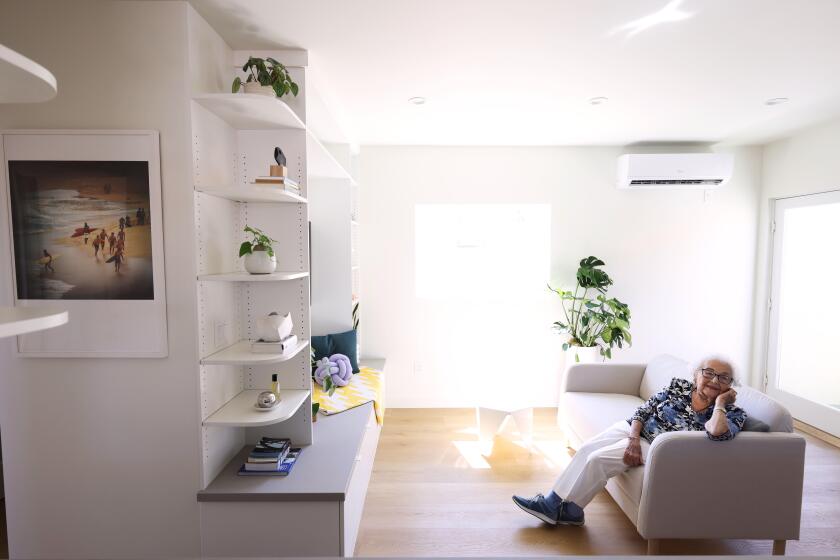Nature at Work : Plants in the office can serve as ‘clean air machines’ that counteract chemicals in a building’s atmosphere.
So we’re back from summer vacation. Back to the office and bye-bye to nature. If you miss the fresh air, it’s most likely because there isn’t any in your office.
In a previous column, I noted that half the “sick building” discomforts that office workers experience can be banished by opening the window.
But what about the rest of us? Most modern buildings are “tight”--you can’t open the window--because of building codes.
The air conditioner (or heating system) only circulates whatever is already in the office. And the air you’re breathing is also affected by chemicals in the carpeting, flooring, furniture, copy machines, etc., plus all the stuff used daily to keep things cleaned up.
No need to quit your job and run off to nature, though. Bring nature into the office. According to Gayle Ward of Plant Keepers in Simi Valley, one living plant per 100 square feet of office space (you know that’s only 10 feet by 10 feet) can serve as a “clean air machine.” The installation of interior plants “makes a lot of difference to a lot of people . . . in what seems to be toxic to them in the air.”
Ward is one of a lively band of indoor plant experts locally who are part of the nationwide Foliage for Clean Air Council. The national spokesman for the group is Dr. Bill Wolverton, a former National Aeronautics and Space Administration scientist who learned a lot researching clean air systems for space vehicles.
I phoned him because I know there’s a debate going on between green plant people and architects. Architects tend to want to solve the problem with ducts and rearrangement of walls. They can’t add windows because of energy laws.
Wolverton wants architects to design in foliage, right from the beginning. Happily, Ward’s company is involved in just this sort of effort at a new building for the Ventura law firm of Muegenburg, Norman & Dowler. She recently installed a three-story palm tree inside the building, in a space provided by the architect.
Wolverton warned me, “You can bore people quick with this stuff.” His studies, reported in The Times in the spring, focused on the three most common indoor air pollutants--formaldehyde, benzene and trichloroethylene--often emitted from furnishings, office equipment and building materials.
In the study, philodendron, spider plant and golden pothos most effectively removed formaldehyde from the air. Gerbera, daisies and golden pothos best removed benzene. Many other plants removed other toxics from the air--bamboo palm, peace lily, even corn plant and English ivy.
I know of a big office in Atlanta where everybody brought a plant. Then they tested the air and found the toxic substances had been reduced 80%. If you go to Vons, Alpha Beta or Lucky’s Food Center supermarkets in Ventura County, chances are that the plants you see were grown in Moorpark by Botania of America, a major national wholesale plant grower.
Ilan Avissar, the manager, reminded me that philodendron cleans up the pollutants in smog. Office air intake, whether from a window or ducts, brings it in--even in Ventura County, he said. “We keep the philodendron near our greenhouse air intake vents because it cleans up the smog and protects the pothos we’re growing in there.
“When we had the pothos near where the smoggy air came in, it got brittle. We moved it near the exhaust vent where the air has been already treated by the other plants and it thrives.”
For further advice on this matter, visit any full-service plant nursery and ask for a staff member who belongs to the California Assn. of Nurserymen.
But your plants won’t do you as much good if, every night, the cleaning staff refills the place with another dose of toxic fumes.
After I had called--fruitlessly--janitorial services around the county to see who used “natural” or “nontoxic” cleaning materials, I dipped into my eco-network for help.
Janie Espinosa, a purchasing clerk for the city of Ventura, is known to be supporting the switch to nontoxics at her place of work. I asked her to help me in my search for an environmentally “clean” cleaning service. She paused a long time before answering. “There’s nobody,” she said. “But it’s a dream of mine.”
It turns out she just finished a study of the matter for her business degree at Antioch University. She buys cleaning materials for the city--specifying nontoxic substances--and provides them to the cleanup crews that work on contract. This is because nobody around here comes already equipped with materials that don’t foul the air.
If it happens that you or someone you know is already doing this and Espinosa and I couldn’t find you, please let us know.
Espinosa, in the meantime, has volunteered to share information on nontoxic cleaning supplies. Bringing nature into the office is a start, but we have to treat it well once we get it there.
* FYI
For office plant information, call a full-service nursery and ask for a staffer who belongs to the California Assn. of Nurserymen.
Or contact Ventura County members of the Foliage for Clean Air Council.
Other sources: Plant Keeper, 583-5181; Interior Plant Specialties, 526-4600; Twyford Plant Laboratories Inc., 525-7125, and Amanda’s Gardens, 499-8987.
For places to find nontoxic janitorial supplies contact city of Ventura Purchasing Department clerk Janie Espinosa, 654-7800.
More to Read
Inside the business of entertainment
The Wide Shot brings you news, analysis and insights on everything from streaming wars to production — and what it all means for the future.
You may occasionally receive promotional content from the Los Angeles Times.










